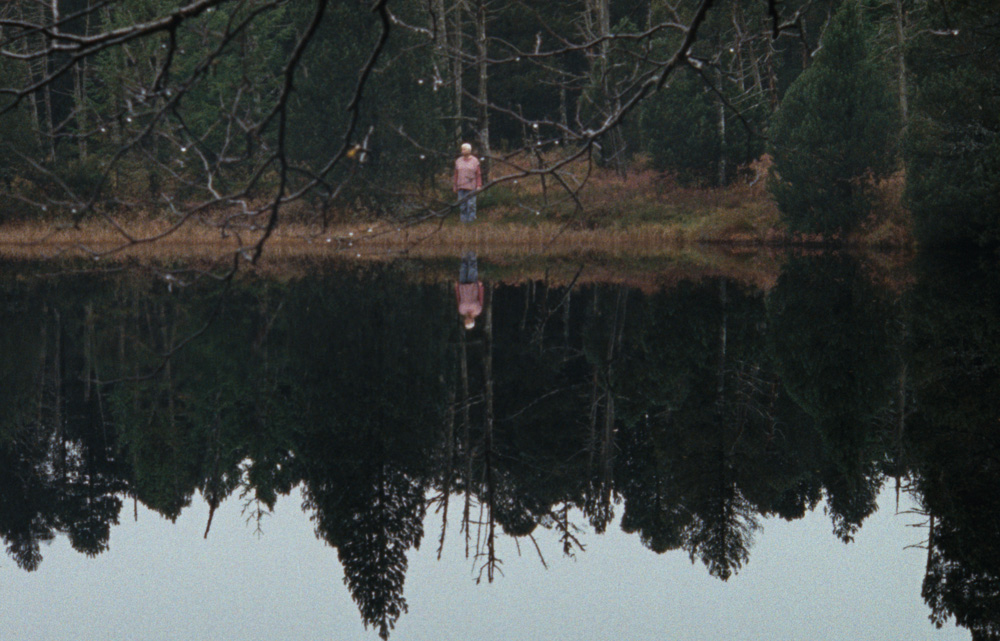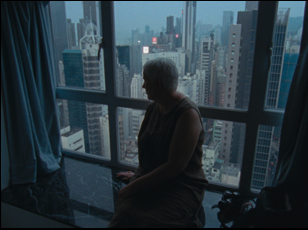Jonas Bak couldn’t wait to leave the nest as a young man, born in Konstanz, Germany where the nearby Rhine River promised adventure beyond what he could imagine, leading to an itinerant twenties in which he’d study film in Edinburgh before settling down in London and eventually Hong Kong. Despite the fact that his debut feature is based on the places he’s been, it speaks volumes that he wasn’t interested in placing himself at the center of “Wood and Water,” instead intrigued with what his mother Anke Bak might make of these places.
While Anke had never acted before, she dutifully accepted a role not too far removed from her real life in playing a recently retired secretary for a Black Forest church who is compelled abroad to visit her elusive son. (In a sign of Bak’s sly sense of humor, the anonymous son may be all around her, yet never actually appears explicitly in view.) After traveling to his apartment in Hong Kong, only to find he’s never there, she’s allowed far more time to discover the metropolis and who she is apart from the life that she had in Germany, dictated by the demands of her family and her work.
The experience proves invigorating, not only for the unnamed mother, but for audiences who are allowed to see the world anew through her eyes as Bak and a small crew channel her growing excitement at getting slightly out of her comfort zone as she comes into contact with locals. Small acts like having her fortune read and sharing a bowl of noodles with the doorman at her son’s apartment building take on profound implications as her world grows bigger and while “Wood and Water” keeps its portrait of a woman’s self-discovery at an intimate scale, it flourishes into grander dimensions as she’s able to reflect on where she’s been and at times realize what she must discard in order to enjoy the moment, with the filmmaker letting one settle into scenes with similar comfort and clarity.
After earning a special mention at Berlinale last year where it made its world premiere and subsequently a spot at New Directors/New Films, “Wood and Water” is now making its way back to New York and the rest of the U.S. where it can act as a much-needed getaway for adventurous cinephiles and recently Bak graciously took the time to talk about how he roped his mother into joining him on his first feature and the process of working with her and other non-actors to bring such vitality to the drama, as well as pulling off an ambitious shoot across two continents.
I was really wanting to make a film with my mother about her life and her situation in life at that time and about her retirement, which was coming up. I wanted us to do something together and we needed to have a script to start rehearsing and finding people and getting people interested to do this with us, but the great thing about it is that the story really just happened and we were part of it. The whole film crew followed my mother in some way without letting go and sometimes I lost sight of what the film is really about — was she looking for her son now or is she finding something else? The idea that a mother goes to check on her son at the other end of the world, that was from the beginning, but everything around it – the politics, and [the idea that] she discovers herself and discovers all these beautiful things that happened in Hong Kong, that happened as we went along.
Was she immediately open to the idea of starring in a film?
[pause] Generally no. [laughs] But because it was me, I sold it to her that I really need this to make this film, so it was pretty smooth. There was a time when we had the script and she read her lines and she had a panic attack, [like] “How am I ever going to act this out?” even though it was so close to herself. So I had to get the cameraman over to live with us in Germany for some time to really get to know each other, [and for her] to get to know the camera. It was a small team and there were many scenes we shot in the beginning that never made the film because they were just us getting to know how this works and how we can work best with this machinery.The way your mother will occupy a frame is really particular. Was how she’d hold the space something to consider in that time?
Yeah, it’s inspired by how she goes through life and who she is as a person — observant, careful, and very curious about other people, but she would never be in your face. She keeps it safe and she’s reflecting a lot and that’s reflected in the visual language. The film is also so much about place that I also use her as a chance to discover a place and when I blow this up on a cinema screen, I give the audience something more than just the close-up, but explore the place alongside her.
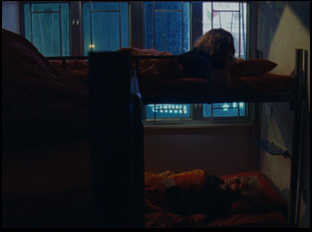
Some of that came in the editing process, but we didn’t have many options because we were shooting on film and my mother couldn’t do many takes because she’s not a professional. Leading up to her retirement, I also did some travels with her to hot countries like Indonesia and Hong Kong, so she got used to the climate already and she knew what was waiting because that heat was quite tough, but she was getting tired quite quickly, so we had to really think of what we were doing. But the way we shot, apart from the middle bit, wasn’t so much about traveling at first because there was the dramatic narrative of looking for her son, so it wasn’t casually wandering on the streets. I feel like in Hong Kong, there’s more urgency whereas in Germany, she’s more reflective. Instead of looking forward into time, she goes back into her past and realizes that’s not the way forward, and then she goes to this new place and everything becomes quite anchored in the present and quite acute in her encounters.
Those scenes are so full of life with the doorman and the fortune teller, who I understand were real-life people you knew from Hong Kong. What was it getting them to engage on screen?
It’s a mix of actors and non-actors. [Alexandra Batten,] the girl in the hostel is a friend and [Patrick Lo] the doorman was the doorman where I lived and we rehearsed, we had a script. For example, the hostel scene and that monologue that she has with the doorman, we wrote it together, but he had different expectations for what it was. He was an extra already in Wong Kar Wai films in the ‘90s, so he thought this was going to be something a lot bigger than just a couple of ex-pats with a camera, so that was quite funny for him. He had a really nice connection with my mother and they really got along and that helped a lot.
The only professional actor was [Rickey Yeung] the translator, the social activist, but in the end, there was no tension mixing the actors and non-actors. I think they all really liked my mother and she was the one pulling this all together. It was not necessarily me being the best communicator between them because with a language it’s difficult, but they saw my mother there from the other end of the world, sweating, trying to get a job done, and they felt for her. That rubbed off on the acting and there’s a genuine connection between them, I think.
Did you see your mother in a different light when you’re working creatively with her?
It was up and down. Sometimes she wouldn’t completely let go [of the fact] that I’m her son. She would make me feel like a little boy sometimes and she’d have a massive go at me. There were just some moments when she walks down the street and looks around pensively and it works so well because inside she’s angry at me and the whole situation. [laughs] But sometimes we would be completely on the same track and without talking too much about the characters, she would get everything and she was really into it. It was a lot of hard work for her and she didn’t want to discuss the character too much. She gave me her presence, but not really intellectualizing the character and that was good – that helped.
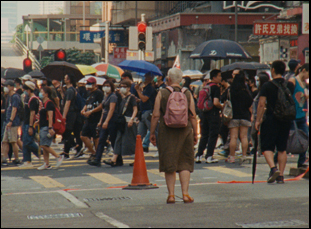
Yeah, we also shot scenes with the son, a silhouette of the son and then meeting actually and talking, but it’s a film for her and about her and the idea is that she lets go of that need to reconnect with the past. There’s also the realization that there’s still more to be discovered in this new chapter in life and it’s a certain way of accepting that her son is there, he has his problems, I’m close to him, but leave it at that and let the movie play on and imagine how they would meet. I didn’t want to take away from that and I was also that son in the end who acted as the son and I didn’t want myself in the film, so it’s all about her. [laughs]
Did anything happen on set that made it into the film and you really liked?
It wasn’t that loose, so nothing happened by chance in front of the camera. But for example, the fortune teller scene, [my mother’s] reaction was genuine because I did the research with the fortune teller [Edward Chan explaining] that these elements are part of her life and we discussed with the fortune teller what they mean, and it was astonishing how close that is to my mother’s real life, so I thought, “Okay, if he says that to her in reality and she hears that for the first time, there might be a great reaction there.” So we ran that scene on one film roll, 12 minutes long, to get her reaction in the end and I think it’s a really touching moment when the smile runs over her face when she hears these things about “Wood and Water” and makes these connections because she [actually] did. It was also because it was at the end of the shoot and she was extremely tired and I think extremely fed up [laughs], but then we shot the scene and she had this genuine smile running across her face. It was very beautiful and that inspired in the end the title “Wood and Water.”
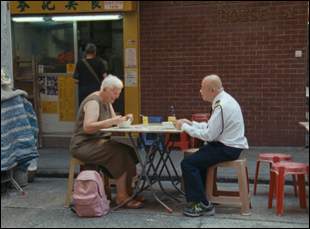
It was tiring, but I would do it again. But it’s also a shame that I think I can never do it again like that. We’re working on a new film now and already the whole thing is quite different. All the planning is different and we’re not as loose, but I have great memories of [“Wood and Water”] and I have to thank my mother for making this happen. It’s a great achievement and I’m really proud of the success we had with the film, but I should never forget that you are given a film as well, especially when you work like this in a hybrid form. You have to be open to accept reality’s gifts and that worked out really well, so I think I’m more thankful than proud of what I’ve achieved. Always keep the balance right. That’s important.
Is it true your next film follows this same thread as far as being connected to your own perspective while seeing it from someone else’s?
Yeah, it’s a sequel in some sort and my idea is to hopefully make these films in the future that center around characters are heroes to me in my life. Another hero in my life after my mother would be my partner, so it continues the story of Max, but through his partner and I created this character, his girlfriend, who’s not [directly inspired] from my life. She would be from Hong Kong and she would sacrifice her home and her family for him and move to Germany, so it’s kind of a reverse story, but Max is my alter ego and again more in the background.
“Wood and Water” will open on March 24th in New York at the Museum of Modern Art with a national release to follow.




